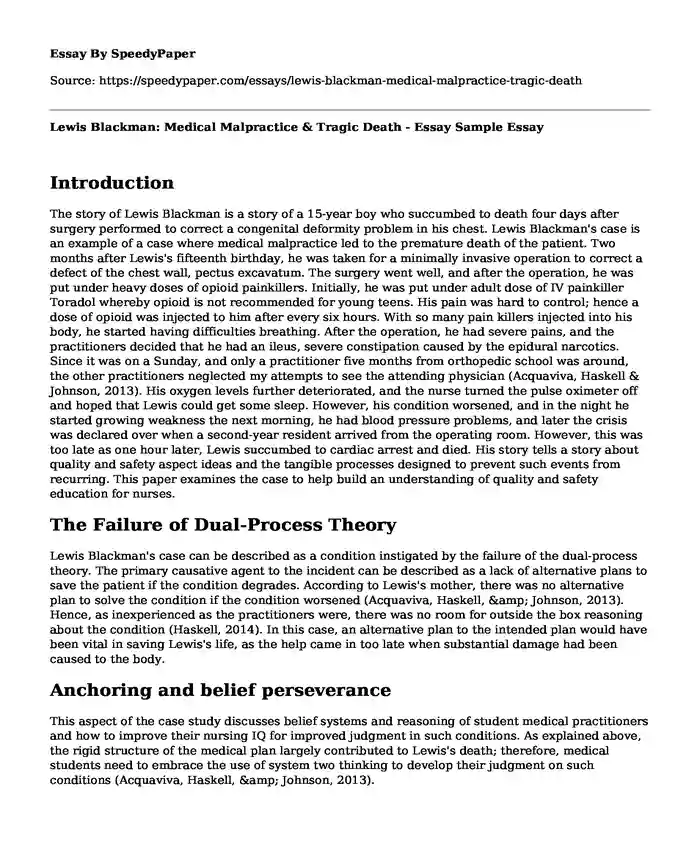
| Type of paper: | Essay |
| Categories: | Nursing Medicine Healthcare |
| Pages: | 3 |
| Wordcount: | 650 words |
Introduction
The story of Lewis Blackman is a story of a 15-year boy who succumbed to death four days after surgery performed to correct a congenital deformity problem in his chest. Lewis Blackman's case is an example of a case where medical malpractice led to the premature death of the patient. Two months after Lewis's fifteenth birthday, he was taken for a minimally invasive operation to correct a defect of the chest wall, pectus excavatum. The surgery went well, and after the operation, he was put under heavy doses of opioid painkillers. Initially, he was put under adult dose of IV painkiller Toradol whereby opioid is not recommended for young teens. His pain was hard to control; hence a dose of opioid was injected to him after every six hours. With so many pain killers injected into his body, he started having difficulties breathing. After the operation, he had severe pains, and the practitioners decided that he had an ileus, severe constipation caused by the epidural narcotics. Since it was on a Sunday, and only a practitioner five months from orthopedic school was around, the other practitioners neglected my attempts to see the attending physician (Acquaviva, Haskell & Johnson, 2013). His oxygen levels further deteriorated, and the nurse turned the pulse oximeter off and hoped that Lewis could get some sleep. However, his condition worsened, and in the night he started growing weakness the next morning, he had blood pressure problems, and later the crisis was declared over when a second-year resident arrived from the operating room. However, this was too late as one hour later, Lewis succumbed to cardiac arrest and died. His story tells a story about quality and safety aspect ideas and the tangible processes designed to prevent such events from recurring. This paper examines the case to help build an understanding of quality and safety education for nurses.
The Failure of Dual-Process Theory
Lewis Blackman's case can be described as a condition instigated by the failure of the dual-process theory. The primary causative agent to the incident can be described as a lack of alternative plans to save the patient if the condition degrades. According to Lewis's mother, there was no alternative plan to solve the condition if the condition worsened (Acquaviva, Haskell, & Johnson, 2013). Hence, as inexperienced as the practitioners were, there was no room for outside the box reasoning about the condition (Haskell, 2014). In this case, an alternative plan to the intended plan would have been vital in saving Lewis's life, as the help came in too late when substantial damage had been caused to the body.
Anchoring and belief perseverance
This aspect of the case study discusses belief systems and reasoning of student medical practitioners and how to improve their nursing IQ for improved judgment in such conditions. As explained above, the rigid structure of the medical plan largely contributed to Lewis's death; therefore, medical students need to embrace the use of system two thinking to develop their judgment on such conditions (Acquaviva, Haskell, & Johnson, 2013).
The role of power and authority
Further, Lewis's case as a condition of the lack of central authority on the 15-year-old health progress after a surgical operation. The judgment will be relied on for vital decision making in case the condition got worse. For improved healthcare provision, student practitioners need to have a supervisor as a sign of power and authority over the patient (Haskell, 2014). In Lewis's case, there was a problem of information transfer; timely intervention would have proved to be helpful for guidance on the critical condition being experienced by Lewis.
References
Acquaviva, K., Haskell, H., & Johnson, J. (2013). Human Cognition and the Dynamics of Failure to Rescue: The Lewis Blackman Case. Journal of Professional Nursing, 29(2), 95-101. doi:10.1016/j.profnurs.2012.12.009
Haskell, H. W. (2014). What's in a story? Lessons from patients who have suffered a diagnostic failure. Diagnosis, 1(1), 53-54. doi:10.1515/dx-2013-0024
Cite this page
Lewis Blackman: Medical Malpractice & Tragic Death - Essay Sample. (2023, Nov 12). Retrieved from https://speedypaper.com/essays/lewis-blackman-medical-malpractice-tragic-death
Request Removal
If you are the original author of this essay and no longer wish to have it published on the SpeedyPaper website, please click below to request its removal:
- Traumatic Injury or Spinal Cord Stem Cell Research, Paper Example
- Final Project Paper: Statistical Analysis Report in Mental Health
- Research Proposal Paper Sample: Mental Health Screening in Prisons
- Research Paper Sample on Irish American Culture
- Essay Sample on Gender Influence on Health
- Essay Sample on Personal and Communal Ethical factors in Euthanasia
- Essay Sample on The Impacts of Nursing Informatics on Patient's Outcomes and Patient Care Efficiencies
Popular categories




